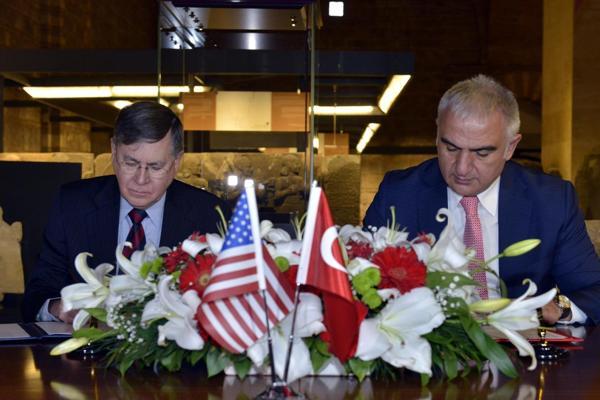Turkey, US sign MOU to protect cultural heritage
ISTANBUL


Turkey and the United States have signed a memorandum of understanding (MOU) for the protection of cultural heritage and the prevention of smuggling of archaeological and ethnological artifacts belonging to Turkey.
“Legal struggles that last for years with enormous costs will be concluded in a very short time and with low costs. This is the biggest deterrent we have,” Turkish Culture and Tourism Minister Mehmet Nuri Ersoy said.
The agreement was signed on July 19, 2020, at the Anatolian Civilizations Museum in Ankara with the participation of the U.S. Ambassador to Ankara, David Satterfield.
Following the agreements to which Turkey is a party, it was a step in a triple strategy, which includes preventive measures to combat trafficking of cultural property, international assistance and return of artifacts, Ersoy said, speaking at the signing ceremony.
While establishing a very valuable cooperation between the two countries, the agreement was a preventive measure in terms of its legal regulations, and a major step that laid the groundwork for the return of artifacts, Ersoy stated.
Stating that due to its unrivaled heritage of civilization, Turkey is the country that gives the most intense fight against illegal activities related to cultural heritage, Ersoy said, “As soon as the memorandum of understanding is brought into force, the artifacts smuggled from our country to the United States will be confiscated and returned to Turkey.
“This important document, which will also constitute a legal basis for operations of the U.S. law enforcement units, will bring active results,” Ersoy said, adding that legal struggles that take years to resolve and cost a lot of money would be resolved in a short period with low costs and that it was the biggest obstacle they have to overcome.
Emphasizing that as a result of the negotiations made by the ministry, the MOU is one of the most comprehensive examples in its field, Ersoy said, “It includes cultural assets starting from 1.2 million years ago until 1923, belongings of Mustafa Kemal Atatürk, the founder of modern Turkey, and the period of the War of Independence.”
“Besides, within the framework of this agreement, we aim to organize mutual exhibitions, cultural activities, and all kinds of joint events that will provide and intellectual interaction,” he added.
Ersoy also said that thanks to this positive approach and mutual cooperation, Zeugma mosaics, the funerary stele of Lydia period, and the Cybele Statue were returned to Turkey.
Referring to the excavations conducted by American experts, including important ancient cities such as Gordion, Aphrodisias and Sardis, the importance of documentation and three-dimensional recording activities carried out in the Kaymakçı Settlement in Manisa, Ersoy said, “I would like to inform you that 651 silver coins, which were unearthed in the Penkalas Stream Project Implementation Study within the scope of scientific activities carried out in the ancient city of Aizonai in Kütahya, have started to be exhibited at the Museum of Anatolian Civilizations.
“In addition to the coins, which are a kind of an album of the last century of the Roman period, the ones belonging to the Augustus period were also found,” he added.
With the agreement, all kinds of archaeological and ethnological work belonging to Turkey will not be allowed to enter the United States.
The Culture and Tourism Ministry, the Foreign Ministry, the Interior Ministry and the Trade Ministry, along with the U.S. Embassy and the U.S. Educational and Cultural Affairs Bureau, will cooperate for the implementation of the agreement.
